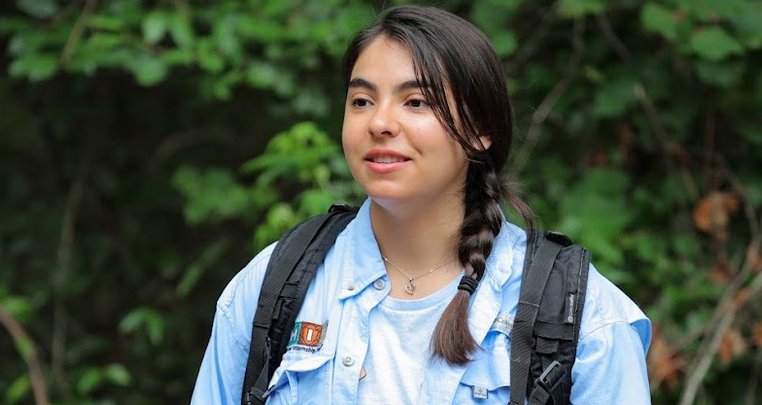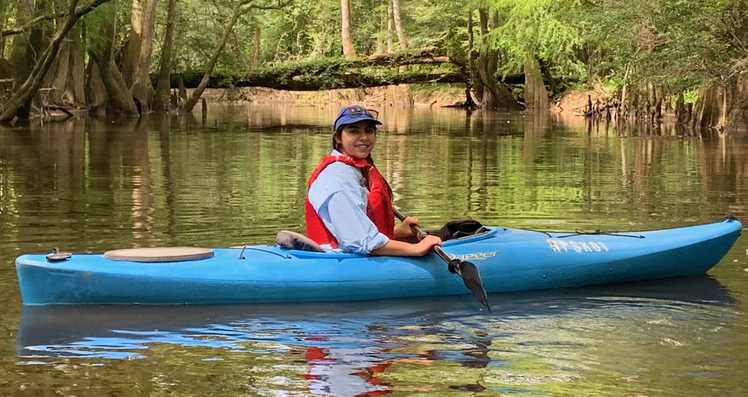Tatiana Mihaita didn’t always know what she wanted to do. But the extra time she spent figuring out her passion paid off, and this summer she interned in something she truly loved.
Mihaita is a Parks and Recreation Management, Therapeutic Recreation graduate student at UNC Greensboro. She obtained a forest wellness internship at the Congaree National Park in South Carolina as part of the Latino Heritage Internship Program (LHIP), in partnership with Environment for the Americas. Forest wellness is specialized recreational programming focused on improving a visitor’s physical, mental and emotional well-being.

Recreation (CTR) graduate student.
During her time at the park she created five new forest wellness programs. One program was a summer solstice hike, in which park visitors went into the woods around 9 p.m. to learn about nocturnal animals and experience forest bathing, using their senses to explore the environment.
Mihaita also participated in several community outreach programs. Another was with a summer camp for children ages 4 to 11.
Many had never been to the park even though they lived nearby.
I taught them how to identify leaves and do leaf-pressing like the Native Americans did, so they could learn about trees.
Mihaita also helped the park partner with the South Carolina Department of Natural Resources for the first time, to enable veterans to fish at the park.
“They’d never hosted anything at the park with a state agency, because it’s a federal park,” Mihaita said. “Hopefully the program keeps up.”
One of her larger projects was creating a forest wellness strategic plan, which hadn’t previously been documented. It stated who the park’s partners are, how the park can improve and a long-term vision for the park.
The internship helped open Mihaita’s eyes to what recreation therapy could be.
It helped in really honing in that recreation can be therapeutic without it being in a hospital setting, which I think can be a common misconception when you add ‘therapy,’ to something.
“In class we are warned that people don’t know what therapeutic recreation is, its value, and to be prepared for that. This was certainly the case with staff, volunteers, and participants and they asked what I was studying and the follow-up question would be, ‘That sounds cool, uh, what does that mean, though?’ So I got a lot of practice finding a way to explain what this field is and advocating for it. Participants would react in a positive way and even make reflective connections to how what we are doing in the forest wellness programs is therapeutic for them.”
While interning at Congaree National Park, Mihaita lived in the park, something she feels fortunate to have experienced. She also was lucky enough to experience something that many only wish they could see: The synchronization of fireflies, when the species flashes simultaneously to attract a mate.
People participate in lotteries to see that, and I got to see that a few times as part of my internship.
Other highlights included kayaking, seeing owls and other wildlife unique to the area.
Mihaita knew this internship would be a good fit for her because she’d previously worked in county parks and with the U.S. Forest Service and enjoyed it. After graduating from Florida International University, Mihaita worked with the federal government for several months, helping at-risk youth in Franklin, NC, who didn’t finish high school.
Mihaita attended graduate school online prior to transferring to UNCG, planning to earn her degree in mental health and rehab counseling. However, she recognized she wouldn’t be happy with that career. She realized she enjoyed being in parks and recreation therapy.
“I was a North Carolina resident, so I looked at NC schools. I saw UNCG and liked the program here. There was a large staff base, the alumni were teaching some classes, and people in the field came back to teach, too. That’s what you want,” she said.
Mihaita started her program last spring and will complete her master’s degree in 2024. She plans to continue working for the federal government when she graduates, hopefully with the U.S. Department of Veterans Affairs (VA).
“When I was a senior in college, the VA kept calling to me. I don’t have anyone in my family who’s a veteran, but people are risking their lives to sign up for this country. They come back and don’t always have the resources they need,” she said. “I can give back to help people who literally risked their lives for me.”
Mihaita would like to work with the VA, doing outdoor recreation therapy at a VA that already has a strong partnership with a national park. She wants to take clients to outings in a national park to do adaptive rock climbing, hiking, water activities, or other opportunities afforded by the park.

“It is usually non-profit organizations that organize these types of community outings since the VA has limited resources. Many national park trails, activities, programs, and facilities are not accessible to those with varying disabilities. I am aware that the National Park Service is trying to look into making it more accessible, but it unfortunately is a slow process,” Mihaita said. “I would love to be part of that progress of joining these two federal agencies to provide opportunities for those with varying disabilities, particularly to those who quite literally fought to protect this land but return home not able to use and enjoy it recreationally.”
With her experience interning and working with federal agencies and Parks and Recreation Management, Therapeutic Recreation degree, Mihaita thinks she’ll be well positioned to make this dream come true.
She also offers advice to people who are unsure about what they’d like to do.
It’s important for people to find what they’re happy about. I kept going back to the outdoors and nature and therapy. It’s okay if you change your mind.
Story by Sarah Newell, HHS Communications.
Photos courtesy of Tatiana Mihaita.